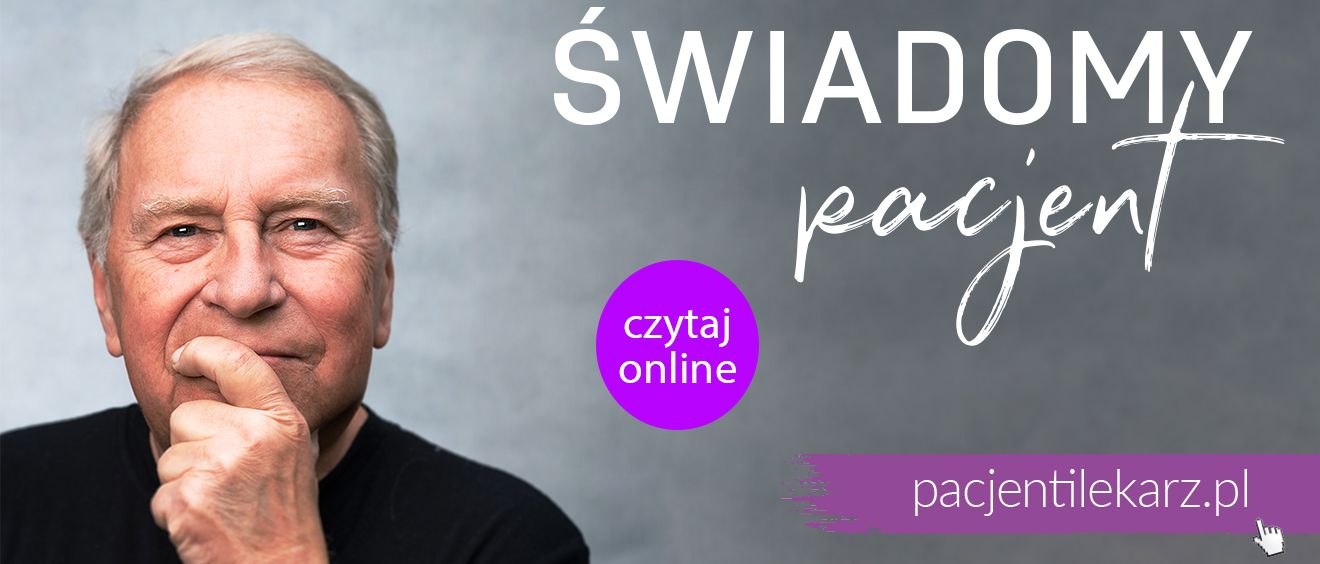Another edition of the 'Conscious Patient' campaign has been launched to raise awareness among patients that they are a vital link in the entire therapeutic process - their knowledge, involvement and responsibility matter.
The highly educational message was ensured through the support of patients and prominent authorities from the respective therapeutic areas, who addressed the topic from the perspective of prevention, diagnosis, treatment and the situation of patients in the era of COVID-19. The articles are available on the portal www.pacjentilekarz.pl
The campaign is organised under the auspices of the Polish Diabetological Society - Prof Dorota Zozulińska-Ziółkiewicz presents epidemiological data, forecasts for the number of diabetes patients in Poland and distinguishes groups at increased risk of the disease.
Professor Jerzy Stuhr, actor, film and theatre director, who was admitted to one of Krakow's hospitals on the night of 12-13 July 2020, became the face of the campaign. His condition was very serious. Rapid intervention saved the actor and has left him virtually unaffected by his stroke.
THE CAMPAIGN SUPPORTS THE FOLLOWING THERAPEUTIC AREAS:
DEPRESSION - A DISEASE OF THE WHOLE ORGANISM
Depression is a severe disease of the whole body, but treatable. For this to happen, the patient must take medication for a sufficiently long period of time, systematically, and not just on an ad hoc basis.
Substantive support on this topic was provided by:
- Dominika Dudek, MD, PhD, Head of the Department of Psychiatry, Jagiellonian University, President-elect of the Polish Psychiatric Association
- Voice of the Patient - Magdalena Słowik
OBESITY - AN EPIDEMIC OF THE 21ST CENTURY
The World Health Organisation (WHO) recognises obesity as a chronic disease, in the same way as hypertension, type 2 diabetes or chronic respiratory diseases. This disease requires a high level of awareness on the part of the patient and its treatment should be multidisciplinary.
Substantive support on this topic was provided by:
- Beata Matyjaszek-Matuszek, MD, PhD, Head of the Department of Endocrinology, Medical University of Lublin, President of the Lublin Branch of the Polish Society of Endocrinology
- Voice of the Patient - Agnieszka Liszkowska Hała
- Katarzyna Partyka, President, CHLO Bariatric Patients Association
THE IMPORTANCE OF LIPID PROFILE CONTROL
Elevated cholesterol levels affect up to 19 million Poles, only 30-40 per cent of whom take treatment. The results of the NATPOL 2011 survey showed that most people with elevated cholesterol levels are not aware of their disease. Meanwhile, cholesterol is one of the main causes of cardiovascular disease, responsible for the occurrence of heart attacks and strokes.
Substantive support on this topic was provided by:
- Maciej Banach, MD, PhD, President of the Polish Lipid Society, Secretary General of the European Atherosclerosis Society (EAS), Chairman of the International Lipid Expert Panel (ILEP)
HYPOKALAEMIA - IT IS WORTH TAKING CARE OF THE RIGHT POTASSIUM LEVELS
Hypokalaemia, or potassium deficiency, can take a dramatic course and manifest itself in very serious diseases. It is worth taking care of the correct potassium levels, especially now, in the age of pandemics. For the sake of your heart.
Substantive support on this topic was provided by:
- Justyna Domienik-Karlowicz, MD, PhD, Department of Internal Medicine and Cardiology, Centre for Diagnosis and Treatment of Venous Thromboembolism, Medical University of Warsaw
DIZZINESS - A HEALTH HAZARD
Dizziness most often has a harmless cause, but as a symptom, it can cause very dangerous falls among sufferers. In order to relieve the patient from dizziness, the cause must be found, as well as medication to abolish the symptoms.
Substantive support on this topic was provided by:
- Dr Konrad Rejdak, Head of the Department of Neurology, Medical University of Lublin, President-elect of the Polish Neurological Society
- Voice of the Patient - Grażyna Kałużyńska
The editors recommend reading all the articles that are part of the 'Conscious Patient' campaign, available on the portal www.pacjentilekarz.pl
The Institute for Patients' Rights and Health Education took patronage of the campaign.

